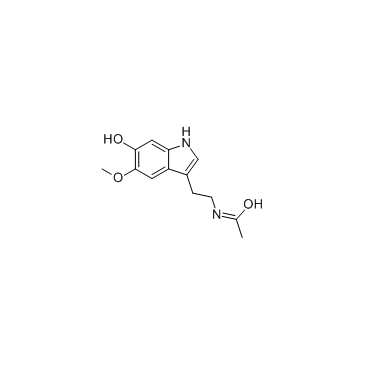Melatonin as an effective protector against doxorubicin-induced cardiotoxicity.
Xuwan Liu, Zhongyi Chen, Chu Chang Chua, Yan-Shan Ma, George A Youngberg, Ronald Hamdy, Balvin H L Chua
文献索引:Am. J. Physiol. Heart Circ. Physiol. 283(1) , H254-63, (2002)
全文:HTML全文
摘要
The present study was designed to explore the protective effects of melatonin and its analogs, 6-hydroxymelatonin and 8-methoxy-2-propionamidotetralin, on the survival of doxorubicin-treated mice and on doxorubicin-induced cardiac dysfunction, ultrastructural alterations, and apoptosis in mouse hearts. Whereas 60% of the mice treated with doxorubicin (25 mg/kg ip) died in 5 days, almost all the doxorubicin-treated mice survived when melatonin or 6-hydroxymelatonin (10 mg/l) was administered in their drinking water. Perfusion of mouse hearts with 5 microM doxorubicin for 60 min led to a 50% suppression of heart rate x left ventricular developed pressure and a 50% reduction of coronary flow. Exposure of hearts to 1 microM melatonin or 6-hydroxymelatonin reversed doxorubicin-induced cardiac dysfunction. 8-Methoxy-2-propionamidotetralin had no protective effects on animal survival and on in vitro cardiac function. Infusion of melatonin or 6-hydroxymelatonin (2.5 microg/h) significantly attenuated doxorubicin-induced cardiac dysfunction, ultrastructural alterations, and apoptosis in mouse hearts. Neither melatonin nor 6-hydroxymelatonin compromised the antitumor activity of doxorubicin in cultured PC-3 cells. These results suggest that melatonin protect against doxorubicin-induced cardiotoxicity without interfering with its antitumor effect.
相关化合物
| 结构式 | 名称/CAS号 | 分子式 | 全部文献 |
|---|---|---|---|
 |
苏达灭
CAS:2208-41-5 |
C13H16N2O3 |
|
Melatonin and its metabolites accumulate in the human epider...
2015-03-15 [Mol. Cell. Endocrinol. 404 , 1-8, (2015)] |
|
Predominance of 2-hydroxymelatonin over melatonin in plants.
2015-11-01 [J. Pineal Res. 59 , 448-54, (2015)] |
|
Molecular cloning of melatonin 2-hydroxylase responsible for...
2015-04-01 [J. Pineal Res. 58(3) , 343-51, (2015)] |
|
Sulfation of melatonin: enzymatic characterization, differen...
2015-04-15 [Biochem. Pharmacol. 94(4) , 282-96, (2015)] |
|
Metabolism of melatonin by cytochrome P450s in rat liver mit...
2008-11-01 [J. Pineal Res. 45(4) , 515-23, (2008)] |